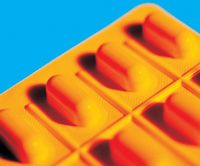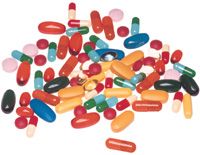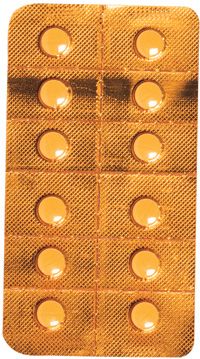Keeping Close Tabs

It was bound to happen, and it's not surprising that it happened in an industry where tablets and capsules carry a core message of health and vitality.
In September, Food for Health International (Orem, UT) began placing a "China-Free" label on its four nutritional product packages, one of which is the manufacturer's 9-a-Day Plus capsule pack. The capsules contain an all-vegetarian formula of essential plant digestive enzymes, essential fatty omega acids, probiotics, and other nonsynthetic foods equivalent to nine daily servings of fruits and vegetables, according to the company.
Food for Health International's key selling point-and the reason for the China-Free label-is the sole use of whole foods in its products. Frank Davis, company president, says the steady procession of news reports about contaminated products from China prompted the decision to use the label. "It's a response to the [headlines] coming out, and we're taking a position that we're not the only ones reading them," he says.
Thomas Tierney can read, too, and he sees both challenge and opportunity ahead. "Whether it's real or perceived, China and the attention given to it in all areas of consumer goods is the 800-pound gorilla sitting on our doorstep," says the president of Vita-Tech International (Tustin, CA), the contract manufacturer of capsule, tablet, and powder supplements. "It is not just about China and their challenges and opportunities. It's a global infection, and their regulatory issues are moving into all countries."
The business-to-business customers of Soft-Gel Technologies (Los Angeles) "are asking for China-free material," acknowledges Jeanette Fisher, RD, marketing director. The problem of tainted products "definitely has had an impact on the industry. We qualify more than one supplier for each raw material so that we can provide our customers with high-quality ingredients."
When they're not hearing it from customers, capsule and tablet manufacturers don't need to read tea leaves in order to divine the public mood. In a Zogby Poll released this past August, American consumers expressed grave misgivings about the safety of food coming from China. The poll results appeared in the August issue of Zogby's American Consumer newsletter, which noted that 59% of 4508 adults surveyed nationwide are not confident that foods from China are safe to eat. And only 30% are confident that the food products they buy from China are safe.
Given the overall perception, Food for Health International's executives believe they simply made a wise business decision regarding the company's capsules and other products. "We weren't trying to make war with China, and we weren't trying to point fingers at anything," Gary Kolman, company vice president, points out. "We have a product line that uses 100% whole food ingredients. We do not use anything that's synthetic. In other words, when we say vitamin C, we use the entire complex, which is made up of eight components. One of those is ascorbic acid. As you see it on almost all labels, 99% of it is synthetic. It's a fractionated vitamin, just one-eighth of the vitamin C complex. We know that approximately 90% of all ascorbic acid, which is synthetic, comes out of China. We just said, regardless of where it's made, 'we don't use synthetics.' But because most of it is coming from China, we are basically China free."

Potentially tainted foodstuffs are not the only international concern involving capsule and tablet supplements. Bill Chekan, global director of marketing for Capsugel (Peapack, NJ), says inconsistent regulations across borders can create problems. The "most recognizable" example, he says, involves CoQ10. Accepted dosage strengths of the coenzyme vary across borders. "In the United States there is no limit on dosage, with the most popular being 100 mg," Chekan says. "In France, it is treated as a prescription drug, although it's illegally sold as a supplement in 30-mg doses and seen regularly in pharmacies. In Italy, the maximum dose is 20 mg, and it's allowed as a supplement."
Consumer concerns over ingredients are behind a growing trend that again involves labels, according to Chekan. He says a "clean label" concept that has taken off in Europe is expected to grow in popularity as consumers become more interested in examining the verbiage on their bottle of Gingko biloba, for example. "They think they're buying gingko and expect to see two capsule ingredients, when they see all these other things," he says.
The presence of the unexpected other components in their healthcare supplement "tends to alarm" customers, Chekan says. As a result, "today there is more of a desire for companies that sell 'natural ingredients' to have an ingredient list that does not have a lot of extra stuff in it." Essential tablet ingredients such as binders are "certainly not harmful chemicals," Chekan points out. "But for people who swallow them, the concept of a 'clean label' is important."
Inspection Systems Help Ensure Tablet and Capsule Quality
A major problem with some slat fillers is that inspection systems often fail to detect the presence of foreign materials, damaged products, and incorrect product counts and dosages.
Recently, Optel Vision (Quebec City, QC, Canada) and Modular Packaging Systems (Fairfield, NJ) teamed up to develop the Optel Vision Slat Filler Inspection System, introduced on October 15 at Pack Expo in Las Vegas.
The new system uses optical setup and vision analysis algorithms to precisely count tablets and capsules. Manufacturers can also use the system to discover broken, chipped, undersized, and oversized tablets as well as foreign materials.
"The system carries out highly accurate product inspections through the process of multiple high-speed, overlapping image acquisitions," says Jean-Francois Lafortune, director of R&D at Optel Vision.
"This process reduces the parallax effect, while compensating for vibrations on the slat filler and for inconsistencies in tablet and capsule movements during funneling. The results are high-quality product images that the system then uses to carry out real-time product analyses."
Lafortune adds that Optel Vision's Complete Product Tracking Tool was integrated into the system, enabling manufacturers to track and eject any bottle with an incorrect count or defective product.
The inspection system can be retrofitted onto slats ranging in size from 16 to 40 in., with 6–20 funnels containing 1–30 cavities per funnel, enabling real-time inspection speeds of up to 420 slats per minute. The system also verifies the presence of product in slats after bottles are filled.
Consistently ensuring product quality and integrity protects a company's product branding and also eliminates packaging problems like undercounts and overcounts, says Andrew Smith, sales engineer at Modular Packaging Systems.
"Given the need and necessity for tablet and capsule inspection on slat fillers, combining Modular Packaging Systems' experience with slat fillers and Optel Vision's experience with developing and implementing innovative inspection solutions was a natural fit in making this project a reality," Smith says.
Upcoming changes to GMPs should give consumers some comfort, even as FDA's new regulations under the Dietary Supplement Health and Education Act (DSHEA) keep manufacturers of tablet and capsule supplements on their toes. The new practices, FDA notes, "apply to all domestic and foreign companies that manufacture, package, label, or hold dietary supplements, including those with the activities of testing, quality control, packaging and labeling, and distributing them in the United States." The industry-wide goal is to ensure that supplements are consistent in identity, purity, strength, and composition.
FDA has staggered the phase-in of the new rule in order to ease the compliance burden for small companies. Large companies must comply with the final GMPs by June 2008. Companies with fewer than 500 employees must comply by June 2009, and companies with fewer than 20 workers have until June 2010.
"The GMPs will help to ensure manufacturers produce unadulterated and properly labeled dietary supplements," FDA notes. Quality problems the rules are designed to prevent include supplements containing ingredient amounts greater than or less than those listed on the label, wrong ingredients, contaminants such as bacteria or pesticides, and mislabeling.
Soft-Gel's Fisher believes the rules will definitely improve the image of the nutritional supplement industry. The new GMPs are "going to play a factor in hopefully weeding out companies that aren't as scrupulous about quality measures," she says. She expects the rules will burnish the credibility of the companies that are able "to stay in the game."
For suppliers such as Soft-Gel, quality extends not only to the effectiveness of the active ingredients, but to the capsules themselves as well. Fisher says Soft-Gel's customers are "definitely interested in vegetarian soft gels," but the manufacturer is grappling with the quality of the seams and seam strength. Competitors already offer the vegetarian products, and Soft-Gel's "is getting there. We're still working on it. We have a fish- gelatin capsule so we can have a non-beef or nonpork source."
One of Soft-Gel's premium supplements is its LyCoQ, which combines lycopene and CoQ10 in one capsule. Targeting cardiovascular health, the exclusive formula blends the company's CoQsol and Lyc-O-Mato extract made by LycoRed (Orange, NJ). In developing its products, Fisher says Soft-Gel looks "for ingredients that are synergistic in a fat-soluble medium. However, we encapsulate water-soluble ingredients as well." She says the company always tries to work "with reputable raw material suppliers" that can help to develop variations of its product lines.
Fisher says a shortage of CoQ10 a few years ago resulted in "only a handful of Japanese suppliers, and they just didn't have enough material available, so the price was really high. All of a sudden the market was flooded with Chinese and Indian material, and the price of material just plummeted."

That sudden flood of Asian raw materials should raise red flags for manufacturers both large and small. Tierney of Vita-Tech International asserts the industry needs to be vigilant. "The fact is, we have to treat the village where herbs are harvested outside of Mumbai in India with the same degree of introspection as we do with something coming from a large pharmaceutical company such as Pfizer or Hoffman-La Roche," he says. "It is an inescapable conclusion that the small player has to step up big on regulatory oversight or be marginalized and lose its market. This is particularly important for boutique herbal vendors."
As for Tierney's 800-pound gorilla, it appears that the chest-thumping primate has splintered the door and lumbered into the reception area. Rather than run out screaming through the back door of the plant, Food for Health International has decided that confronting the beast head-on is the best approach. Hence, the new "China-Free" label.
A recent flurry of press notices may take some of the sting out of the less-favorable repercussions caused by the company's decision. "A few of the stores were somewhat angry to a degree with us," Kolman, the vice president, says "because they felt that by us saying 'China-free' it could possibly affect the sales of other products." At least one steady distributor angrily refused to carry Food for Health products any longer because it believed the label would reflect badly on other products that are free of such printed cautions. The reaction came despite the fact that, at $69.95, products such as the 9-a-Day Plus capsules are some $30 to $20 more expensive than non-whole-food supplements.
Food for Health International may derive some encouragement from where it counts the most, however. The company's supplements are not available in China, but the company has received "a few responses from consumers who have read the articles and seen reports we put out," Kolman says. "At first we thought someone was going to throw darts at us, but the reaction was just the opposite. They said, 'Thank you for doing this because it's making our life a little less risky. Manufacturers in China are beginning to take notice that they need to clean up their act a little bit, so it benefits us as Chinese consumers.'"


